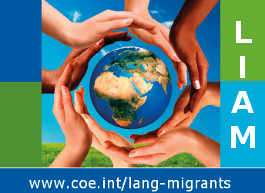Language repertoire
The individual language repertoire
Migrants’ questions are not confined to ensuring that they learn the host country’s majority language. The mechanisms to be built up must provide the preconditions for successful reconfiguration of their language repertoires.
Plurilingual competence, repertoire of languages
The concept of repertoire of languages (or language repertoire) is not specific to migrants: it refers to the fact that all individuals are potentially or actually plurilingual. The “plurilingual competence” is the manifestation of the capacity for speech which is part of the genetic make-up of all human beings and which can be used in several languages in succession throughout a person’s lifetime. (The Council of Europe differentiates between plurilingualism as a competence for speakers (able to use more than one language) and multilingualism, which refers to the presence of several languages within a given area). The repertoire of languages known by each individual (individual repertoire) comprises languages acquired in different ways (languages learnt at home from infancy onwards, learnt subsequently during schooling or afterwards, learnt independently, etc) for which people have different competences (everyday conversation, reading, listening, etc) at levels of mastery which also differ (elementary, independent, experienced, etc). These languages can have specific functions (communicating within the family, socialising with neighbours, working, expressing one’s belonging to a group, etc), but these functions can nonetheless be fulfilled jointly by several languages. This distribution of languages in the repertoire may change over time or may depend on communication situations (using several languages simultaneously in exchanges, known as code alternation).
Learning languages, reorganising repertoires
Learning a new language can modify the inherently unstable balances between repertoires. In most cases, when a foreign language is learnt at school, the repertoire is broadened without any further consequences, apart from an enhanced perception of cross-connections between the existing languages. In the case of migrants, the reorganisation is more complicated, because acquiring the majority language is an important issue (indeed a vital one when residence rights depend on it), a fundamentally identity-based process that takes place in full public view in the host country and which is usually called linguistic integration (although this over-simplifies matters). In fact, such integration is only one of the possible ways of reorganising repertoires, which is characterised by the fact that it occurs under pressure, the pressure of efficiently communicating in a new social space and building up a (new?) linguistic and cultural identity in that space.
Plurilingual education for all
From the Council of Europe’s point of view, the goals of language teaching, for whatever purpose, are therefore those of plurilingual education (for which the CEFR is one implementing instrument). Such education is geared to enhancing individual language repertories, especially the language(s) already present, in order at least to prevent them from becoming a sign of marginality on the part of the adult migrants themselves or their children. It is also intended to expand the repertoire in accordance with individual needs, expectations, interests and desires and the role which the individual wishes “his” languages to play in building up his plural belonging, which establish the social player in his or her cultural uniqueness. The central place of plurilingualism thus constitutes one of the bases for critical education in linguistic tolerance, ie intercultural education.
JCB
Related resources
- The role of literacy in the acculturation process of migrants, 2008, Hervé Adami
EN FR
- Education: Tailor-made or one-size-fits-all? A project commissioned by the Nederlandse Taalunie, 2008, ITTA/Elwine Halewijn, CTO/Annelies Houben, Heidi De Niel
EN FR
- Learning the language of the host country for professional purposes, 2012, Claire Extramiana
EN FR
- The linguistic integration of adult migrants and the ‘Common European Framework of Reference for Languages’, 2012, David Little
EN FR



